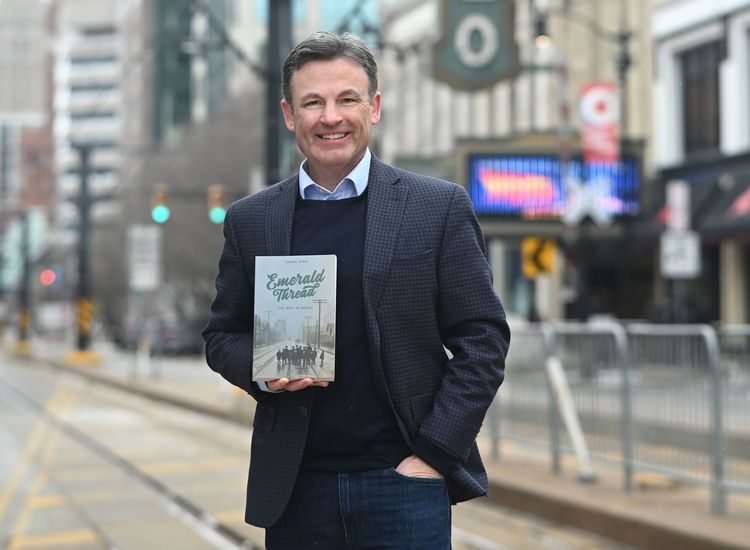Breanne McUlty in a scene from "Overdosed."
By Peter McDermott
The higher up you are in the drug-dealing food-chain in the U.S. the more protected you will be from real-life consequences. Nobody from the corporations McKesson or Perdue has gone to prison, for example.
That’s one important takeaway from Mary Sue Connolly’s “Overdosed,” which focuses its story of opioid addiction on Petersburg, W.Va., and neighboring Moorefield.
It was presented by the County Waterford-born filmmaker a few weeks back at the Microscope Gallery in Brooklyn, and that might have suggested it would take an avant garde approach in its story-telling or at least employ the cinéma vérité, or fly-on-the-wall, techniques pioneered by artists like Frederick Wiseman.
But Connolly’s resume includes positions at CNN and CBS, and so perhaps not surprisingly she has taken a fairly conventional route. The result is a magnificent piece of journalism, in which she interweaves over the film’s 75 minutes the local story with the broader national issue of a crisis afflicting American communities. (“Overdosed” has found a distributor and it will be available to view in 2021.)
At its center are Bre (full name Breanne McUlty, a co-producer on the film) and her friends Kammie, Jenni and Brian, who’ve put prison behind them to become advocates in the fight against the scourge of drugs, whether of the prescribed kind or their cheap heroin replacement. The latter, we hear, is easily acquired on trips to Baltimore and brought back via I-70 and I-81, a route that locals call the “heroin highway.”
“There’s not one person whose life is not touched by addiction,” Kevin says of his home town.

Bre in a still from "Overdosed."
There’s a clip of a TV news report revealing that in one five-year period the distributor McKesson shipped 100 million opiates to West Virginia, a state with just 1.8 million people. A Charleston Gazette-Mail headline highlighted on screen tells an even more dramatic story — “Drug firms poured 750m painkillers into WV amid rise of overdoses.”
“Rattle a pill bottle,” Jenni says, “That’s West Virginia’s mating call.”
Kammie has sold to people older than her parents. “It’s hard to look at people in this town and think they have an addiction that I know about,” she says.
Jennie says she knows a prosecutor with a habit.
Kammie says, “It’s a beautiful area and you would think that it has so much to offer, but people are killing people over drugs.”

In one scene it’s twilight outside Bre’s place in Petersburg and she’s holding her toddler son while talking to the camera. A neighbor’s voice from behind her across the street suggests that she is bringing discredit upon Petersburg by cooperating with Connolly’s film.
“Everybody is saying I’m making it look like that everyone is on drugs,” she says on another occasion. “Everyone is on drugs. Well, maybe a quarter of people in this place are not on drugs. It’s like the whole town is a cult.”
Bre asks, “Does the community want to change or does it not want to change?
Kevin recalls being an overweight teenager who desperately wanted to fit in. He went from 250 pounds at age 16 to 170 at 17. “I was a terror to my parents, to my community. I was selling drugs, I was doing things that were obviously, blatantly illegal,” he says.
“Stopping was never a thing because there’s no resources, no detox beds, there’s nothing available,” adds Kevin, who in the film is endeavoring to build a residential recovery center.
Bre’s brother, the best friend she says she could ever hope to have, was lost to the drugs epidemic and she confesses to being bitter at the world. Her father was injured while serving in the army. He suffered from depression afterwards and developed an addiction to Oxycontin. He first attempted suicide when Bre was 9; on a later occasion while he was in a coma, his friends moved into their home. “It became a dope house,” she remembers.

Kevin has gone from prison inmate to an advocate for resources to deal with addiction.
The only visible scars from her difficult life are knife marks on her arms from her early teen years. A little later, she learned even worse forms of self-harm — imbibing hard liquor and Pepsi laced with insecticides in deliberate efforts to kill herself.
It’s often a case of prison or death, and for Bre and Kevin, it was ultimately behind bars that they began to turn their lives around.
“Women in Federal prison raised me,” Bre says. “Women from Colombia, women from New York, women from Boston.”
But sometimes, it’s both prison and death, as in the case of Brayden, a friend of Bre’s, during the making of the film.

Bre and Kammie in their younger days.
And often, the person has never been to prison, and family members are overwhelmed by the sudden loss of a loved one, like Brandi, another friend of Bre’s, who had no idea her beloved brother was using the needle.
The filmmaker travels the 28 miles to Romney, W. Va., to talk with Bryan and Venesa, a brother and sister who lost both their mother and sister to addiction to prescription drugs. An EMT unit speeds by with full lights on, its siren blaring — “probably too late,” suggests Bryan, given the long journeys to be covered in this rural area.
Dr. Rajan Masih, who gave painkillers to just about anyone who asked, comes up in that conversation and in a lot of others besides. He was a community “rock star,” a “celebrity.” He did time, and lost his medical license, but has put his life back on track. Now he has a state job giving talks about addiction.
DEA Detective Guy McCartney says that Masih, between 2004 and 2009, wrote over 30,000 prescriptions of controlled substances. “So we knew we had a problem,” McCartney says.
It seems unfair that a professional, middle-aged married man got the same four-year prison term as Bre; she had just reached adulthood when she was locked up. And he did a great deal more damage than she did. Yet, he is still regarded with respect and some of his rock-star sheen has not worn off. In contrast, as we learn at the beginning, a frustrated Bre is getting out of Petersburg with her fiancé and child, and starting over in Georgia.
But at least Masih did serve a prison term; there was none for anyone at Judy’s Drugs Store, next stage up in the chain. That business had a cosy working relationship with Masih filling his prescriptions and it opened a second branch in Moorefield to deal with the demand. Even after a $2 million fine, Judy’s was soon back to its old ways.
McKesson failed to flag the huge amount of pills going to such pharmacies. It has paid $150 million in fines for not reporting these suspicious orders, and it now must work with an outside monitor. Text on screen tells us that McKesson is the 7th largest company in the U.S., with its 2018 revenue put at $214 billion. It denies any wrongdoing.
A lawyer, Mike Papantonio, argues in a TV interview that the corporate malfeasance here is manslaughter. He says, “Why do we treat them differently than a kid on the corner that’s selling marijuana?
And then there’s the manufacturer Perdue, which began pushing Oxycontin from the 1990s onwards as the miracle remedy for pain.
Someone with a painful childhood, we learn, can be targeted by the pusher, just as a particular community can be identified as a good market for pain pills. But there are all sorts of other reasons for taking drugs; “Overdosed” reveals the number 1 reason for selling them: it’s a remarkably easy way to make money, and that’s the case all the way up the chain.
Stop blaming outsiders, like Mexicans for instance, Bre says, “It’s America that’s ruining America.”
Connolly’s film ends with the October 2020 news that Perdue Pharma pled guilty to criminal charges for opioid sales and has agreed to an $8 billion settlement.
An NPR report of Nov. 17 said, “The Stamford, Conn.-based business was hugely profitable but executives now acknowledge their efforts helped fuel a deadly addiction epidemic that wrecked lives and killed tens of thousands of Americans.”
It continued, “Critics of the federal settlement point out Purdue Pharma executives pleaded guilty once before to illegal marketing practices in 2007, but quickly resumed their campaign to maximize profits.
“Opponents of the deal also note that under its terms, members of the Sackler family will pay a small fraction of the fortune they earned selling Oxycontin.
“They've agreed to forfeit $225 million of their personal wealth, while admitting no wrongdoing and facing no criminal charges.”









